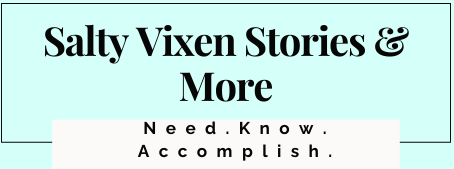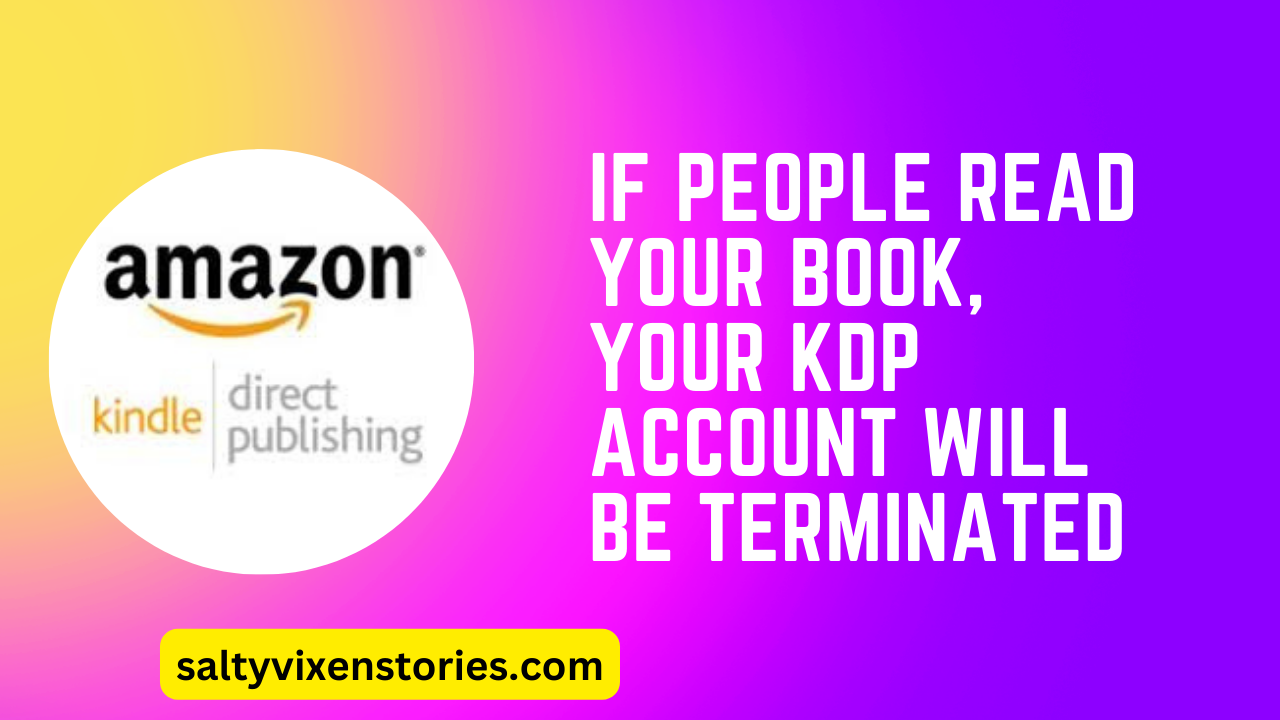Okay, so maybe my title is a bit shocking. Lemme explain…
As an author, you’ve decided to leverage sales from all other book publishing platforms and go all in with Amazon’s Kindle Unlimited program. Maybe one person is reading your book (80 pages a day) and then, all of a sudden, your page reads skyrocket to the equivalent of $125 earned on one day (25,000 pages).
Did you forget about a scheduled promotion? Did someone post a great review on a blog and all of their followers started downloading and reading immediately? You have no idea, but you’re elated that your book is finally getting some traction.
The next day, you eagerly open you KDP dashboard for more results. At the same time, you check your email and see this from Amazon:
During a review of your account, we found activities that are attempting to manipulate our services. This is a violation of our Terms and Conditions, and as a result we are terminating our relationship with you and closing your account, effective immediately. Examples of manipulation include abnormal reading activity and attempting to publish books that violate our Content Guidelines.
Yeah, has happened to thousands of authors over the years, and each year, Feb/March, June/July, Nov/Dec are when thousands of author get their accounts wrongfully terminated all because KDP AI BOT thinks author had bought 'bot/click farms'
Click farming is a scam in which a group of people or bots create a bunch of accounts, enroll in KU, and then speed through a bunch of books to generate fraudulent revenue for the author(s). It's usually easy to detect because the clicks from one page to the next usually happen faster than any human could possibly read, and the accounts used are typically very short-lived.
You as an author aren't going to have any way to prove that didn't happen, because you don't have any way to access to the activity logs for the reader account(s) involved, so don't even waste your time trying. You aren't affected because you aren't paying the bot farmers to try to defraud Amazon. Click-farmers often try to cover their tracks by borrowing and zipping through unrelated books, in addition to the books for which they are being paid. When they're caught, ALL of their pages-read are erased, including those of authors who never did anything and just suffer collateral damage. Sadly, there's nothing you can do about it.
In a nutshell, authors get punished for something we didn't do. Unfortunately, Amazon's response does seem somewhat arbitrary. As in a straight 50% reduction for a given month, as opposed to the removal of pages from fraudulent accounts. Which has led some to believe they are more than just victims of scamsters but the victims of a poorly programmed Amazon algorithm punishing them because they have received a surge of page reads in release months which the AI BOT has stamped MUST BE FRAUD.
This is happening to thousands of publishers every month. When you think about it, detecting basic click farming is not that difficult. Look for unrealistically fast "reading" speeds, unrealistically consistent timing scrolling from one screen to the next, and reads from accounts that pop up, do a bunch of reading, and then cancel without ever paying. Then you have to look at it another way, many readers look at ebooks, especially when they pay the $9.99 a month for Kindle Unlimited - they flip quickly through books like flipping through pages of a magazine while standing in line at the grocery store. Either for fun or to see if they want the print magazine. How is this click farming?
The reality is this. KDP Kindle Content Review can't tell the difference if it is a click farm bot or if it is someone flipping through pages to see if they want the book that easily unless KDP does deep dive research, which they do not. Suspicions are further fueled by Amazon's typical response. Boilerplate emails and a flat refusal to reveal how they reached their conclusions.
Amazon’s customer service extends to customers of the site, not to business partners. Instead of reaching out and speaking with the author, instead of destroying a relationship and terminating legitimate sales–maybe Amazon doesn’t need that money–Amazon just shuts down the account and ghosts the author. Really. The bots tell an author the problem is being investigated, but by a real person? It can find a lower price of your book and update your product page within hours, but it takes days–with no end in sight–to investigate this?
But wait, if all the downloads are from “systematically generated accounts, or manipulation of services” doesn’t that mean Amazon received payment for all of those “scammy” KU subscriptions? Did it refund the money to whoever opened those accounts (LOL)? Did it close all of those KU subscription accounts? Did they investigate those accounts and close them before doing a deep dive investigation to see that you the author wasn't taking in that scamming thing? nope. They are quick to judge. KDP Kindle Content Review treats authors like you are at a Salem Witch Trial - guilty and no way to prove otherwise.
Well, if you’re an author struggling to get page reads, and then your poor book is the target of a scammer, your recourse is to go wide and build such an extensive platform that sales from Amazon don’t move your bottom line. Indie authors have had success with this strategy, with a few reporting their income from Apple and Kobo is greater than what they earn with Amazon.
I want to highlight a few more things about Scammers who decide to screw us authors over:
(1) What these scammers are doing isn’t particularly sophisticated but Amazon is still struggling to deal with the problem.
(2) Customer service levels at KDP are still unacceptable. Basic issues are generally handled well, it should be said, but when there is a serious or complex problem, KDP customer service can be awful. This has been an issue for years now and has never been properly addressed.
I don’t have access to Amazon’s internal systems, however, a simple google search (and it is wrong to even think about hiring scammers- note, I and thousands of other authors out there have never once hired scammers. KDP do better before judging if an account was actually manipulating services), I can generate a huge list of both scammers and likely for-pay reviewers (and the authors and publishers using them). It’s really not too hard so I don’t know what Amazon is struggling with here. It’s quite obvious what the scammers are doing:
- Publish a title with keywords stuffed in the title so that it appears high in Search.
- Set it free so paid reviewers can download for free and add their paid-for reviews.
- Return it to the paid listings where it will appear even higher in Search now thanks to the free downloads.
These scammers are using a number of tricks to boost their Sales Rank, appearance in search, general visibility, and KU payouts:
- Title keyword stuffing. The most common trick involves inserting genre keywords in the book’s title, so instead of “Saved By The Big Bear” (an invented example) you will get something obnoxious like “ROMANCE: Shifter Romance – Saved By The Big Bear (Shifter Paranormal SEAL Cowboy Clean Romance)” as the book’s title. Then when a reader searches for “clean romance” or “paranormal romance” this title will appear.
- Page bloat. A common ruse is to upload 25 titles with different covers, but each containing all 25 books, with the order rotated slightly. Others fill the books with “translations” of the main title, or random content pulled from who-knows-where. This can turn a $1 KU payout into a $12 payout – from the common pool (i.e. your pocket).
- Click here tricks. Once the page count is bloated, then various inducements are given to readers to click to the end – whether that’s some kind of Table of Contents manipulation, telling the reader the “real” content is there, or offering them free books, or whatever.
- Category squatting. Titles are often added to a bunch of additional categories – often completely unrelated to the advertised content – for extra visibility.
- Cover impersonation. This one specifically relates to “study guides” which are often extremely short (i.e. 25-page) summaries of popular titles. Often the titles are designed to look like the original book and aren’t flagged as study guides. The scathing one-star reviews underneath show how many readers have been hoodwinked.
- Title impersonation. Often these study guides will insert the actual title of the book in the “Author” field so you will have a “study guide” for, say, Harper Lee’s debut and “To Kill A Mockingbird” entered as one of the authors. This hugely boosts appearance in search (try it and you will see what I mean – this one is not an invented example, and the author of that “book” is absolutely cleaning up right now).
- Author impersonation. This time they stuff a famous author’s name into the title of the book. Again, it boosts appearance in search and fools readers.
I can figure out all this with a little searching. Surely Amazon can do better. There are already specific policies forbidding these actions. Amazon doesn’t need to scramble to produce a new framework for handling these guys. It already has the rules in place. The problem is, authors like you and I, are getting put into this "you , the author, are being punished for something you didn't do but AI Bot might. say so, we are not going to let you talk to prove your case because all authors do wrong things... therefore, account is terminated" - KDP Do better. Stop screwing us authors who were following the rules.
It just needs to start applying them.
Most of my books were in KU until I got that email "Manipulation of Services" since then, I got smart and published my work at other platforms and also on my ebook store, which I hope you as an author want to have your book on the ebook store (remember, you, the author, holds 100% copyright, we are just a ebook store, hosting your beautiful work!)




















